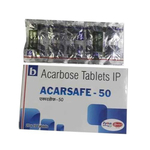recarb
Introduction to recarb
Recarb is a medication primarily used to manage blood sugar levels in individuals with type 2 diabetes. It helps in controlling the rise in blood sugar levels after meals, making it an essential part of diabetes management.
Composition of recarb
Recarb contains the active ingredient Acarbose, which works by slowing down the digestion of carbohydrates in the intestines.
Uses of recarb
- Helps manage blood sugar levels in type 2 diabetes patients.
- Prevents spikes in blood sugar levels after meals.
- Can be used in combination with other diabetes medications for better control.
Side effects of recarb
Common side effects:
- Gas
- Diarrhea
- Stomach discomfort
Serious side effects:
- Liver problems
- Skin reactions
- Swelling
- Intestinal blockages
- Low platelet count
Precautions of recarb
Recarb can cause hypoglycemia (low blood sugar), especially when taken with other diabetes medications. Its effects on fertility and its safety during pregnancy and breastfeeding are not well understood, so it's crucial to discuss these with your healthcare provider. Be aware of potential interactions with other medications and supplements, such as amoxicillin, corticosteroids, and vitamin C.
How to Take recarb
- Take recarb by mouth with the first bite of each main meal.
- The starting dose is usually 25 mg three times a day.
- If needed, the dose can be increased to 50 mg three times a day.
- The maximum dose depends on your weight.
Conclusion of recarb
Recarb is an effective medication for managing blood sugar levels in type 2 diabetes patients. While it offers significant benefits, it's important to be aware of its side effects and interactions with other medications. Always consult with your healthcare provider to ensure it's the right choice for your diabetes management plan.
Similar Medicines
Available in 2 variations

Recarb 50 Tablet
Recarb 50 Tablet
strip of 10 tablets

Recarb 25mg Tablet
Recarb 25mg Tablet
strip of 10 tablets
Related Faqs

Can Recarb cause diarrhea?
Yes, diarrhea is a common side effect of Recarb. However, this does not affect everybody. Any food containing carbohydrates, such as household sugar (cane sugar) can cause diarrhea and severe abdominal pain. If diarrhea persists or becomes severe, then contact your doctor immediately.

What will happen if more than the recommended dose of K Carb is taken?
If you take more than the recommended dose of K Carb then it may cause temporary increase in flatulence (accumulation of gas), diarrhea, and abdominal discomfort. It is advised to avoid meals or drinks containing carbohydrates for the next 4-6 hours.

What will happen if more than the recommended dose of K Carb is taken?
If you take more than the recommended dose of K Carb then it may cause temporary increase in flatulence (accumulation of gas), diarrhea, and abdominal discomfort. It is advised to avoid meals or drinks containing carbohydrates for the next 4-6 hours.

Does Acarex cause hypoglycemia?
Acarex does not cause hypoglycemia by itself though it has glucose-lowering effect. However, a fall of blood sugar levels in the hypoglycemic range may occur when given along with other antidiabetic medicines or insulin. If this occurs, consult your doctor who may modify your dose accordingly.

Who should not take Acose?
Acose should be avoided by patients who are allergic to it, have severe liver disease, or have inflammation or ulceration of intestine (eg Crohn’s disease). The use of Acose should also be restricted in patients who have an intestinal obstruction (cramping pain, vomiting, obstipation, and lack of flatus). In addition, patients who have a large hernia or an intestinal disease where food is not digested or absorbed properly should avoid Acose. Along with that, Acose should not be used by women who are pregnant or breastfeeding.

What will happen if more than the recommended dose of Acose is taken?
If you take more than the recommended dose of Acose then it may cause temporary increase in flatulence (accumulation of gas), diarrhea, and abdominal discomfort. It is advised to avoid meals or drinks containing carbohydrates for the next 4-6 hours.
Related Posts

1:15
5 Healthier Sugar Alternatives!

1:15
Pregnancy and Diabetes: What to Eat? | Foods to Eat for Gestational Diabetes!

1:15
Are Your Hormones Out Of Balance? Signs & Symptoms!

1:15
How Do You Know If You Have a Vaginal Infection? Warning Signs!

1:15
Top Health Benefits of Cinnamon | How to Use It for Better Health!

1:15
Is Your Blood Pressure Too Low? What Are the Best Remedies to Fix Low Blood Pressure Instantly?

1:15
Mala D: How it works, When and How to take Mala D and Side Effects of Mala D!




















.svg)
